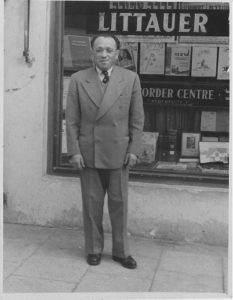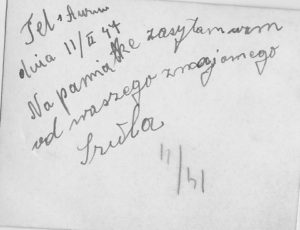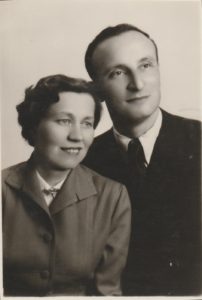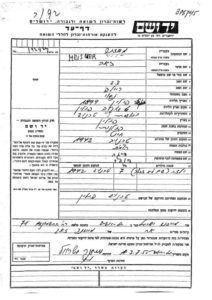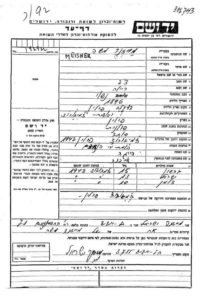Is the man in the picture, marked as Srul, Israel Meisner (Meizner) whom Ludwika Chomentowska saved from the Holocaust?
The picture comes from the family archives of Halina Blicharczyk née Chomentowska, granddaughter of Ludwika Chomentowska.
Wersja polska:
http://lekidukielskiedukla.pl/?p=2742
They lived nearby, in Dukla, Rymanów, Sanok, Krosno, Rzeszów, Tyczyn, Lwów. They engaged in trade, ran their shops, stalls at the market, they were glaziers, bookbinders, they ran inns and bars. Few were able to survive the war in their place of residence. Today we hear about them mostly in the context of awarding the honorary title Righteous Among the Nations. If someone from our village was brave enough to help them, we seem to be more concerned about it.
What happened to those that my grandfather used to meet, my grandmother bought her matches or threads from?
My Jews
After long and arduous research I’m still not sure whether Izrael Meisner (a.k.a. Meizner) is Mr. Srul who lived in Dukla before the war. He used to come to Łęki on foot through the forest almost each Monday. Sometimes he would come at the end of the week. He’d wander the village asking about calves for sale. He had a clever way of transporting them. He did put a rope on calf’s neck, but he’d also put his fingers in its muzzle to suck on and it followed him willingly.
“He was a good looking man, rather short. He used to wear a hat, because I can’t remember his hair” – says my mother who saw Srul for the last time probably in 1942. “By then the Germans were already taking Jews to the camps. People were afraid to help them, it was punished by death. I watched him from the window of our house that was being built at the time, as he wandered around our garden. He walked to and fro, didn’t know what to do with himself. He was gone in a bit. Then he turned up at Chomentowska Frankowa’s brick house, she hid him somewhere in the basement. But I found out about it only after the war.”
Granddaughter of Ludwika Chomentowska (Frankowa), Halina Blicharczyk née Chomentowska confirms that. “Mr. Srul probably sheltered at my grandma’s place in July 1942 when the Germans were terminating the Jewish population in Dukla. My parents had already been married by then, they got married on April 26, 1942. People from Łęki Dukielskie knew Mr. Srul. He’d often come over because he traded cattle for a living. Unfortunately, I don’t know Mr. Srul’s personal data. I know that he was married, had children and lived in Dukla. He lost his entire family, they were killed by the Germans” – says Halina Blicharczyk.
Ludwika’s granddaughter also knows the details of Mr. Srul’s concealment. “When he was wandering around the village looking for a place to hide, my grandma Ludwika let him in and hid him in the basement at first and later on in the attic, under the hay. Nobody knew about it, in the beginning not even my parents knew about the Hidden One. They were terrified once they found out because they knew what the punishment for hiding a Jew was, still, the entire family helped to hide the Man. I don’t know how long Mr. Srul was hiding at my grandma’s place. After the war the Survivor left for Tel Aviv and wrote letters to my grandmother, sent her his picture.
He informed my grandma that he’d got married / started a family. In the early eighties my mom wrote to Mr. Srul to his Tel Aviv address but the letter was returned with a note „Addressee Unknown.” – says Ludwika Chomentowska’s granddaughter.
Is the man in the picture, signed as Srul, Israel Meisner (Meizner), whom Ludwika Chomentowska saved from the Holokaust? The picture comes from the family archives of Halina Blicharczyk née Chomentowska, granddaughter of Ludwika Chomentowska.
Who was Ludwika Chomentowska née Wojnar, who got awarded the honorary title Righteous Among the Nations but never got to receive her medal? She was born in Łęki Dukielskie on 11.30.1889, died on 10.09.1971. During the World War II she was a widow. Her husband – Franciszek Chomentowski – died in 1934. Together with her son Antoni Chomentowski, born on 11.01.1916 (died 12.10.1970 ) and her daughter-in-law Władysława Chomentowska, born on 10.24.1919 r. (died 02.19.2006), she ran a farm in Łęki Dukielskie. Ludwika’s family lived in what was a the time considered a big, brick house with a tin roof, attic and a cellar.
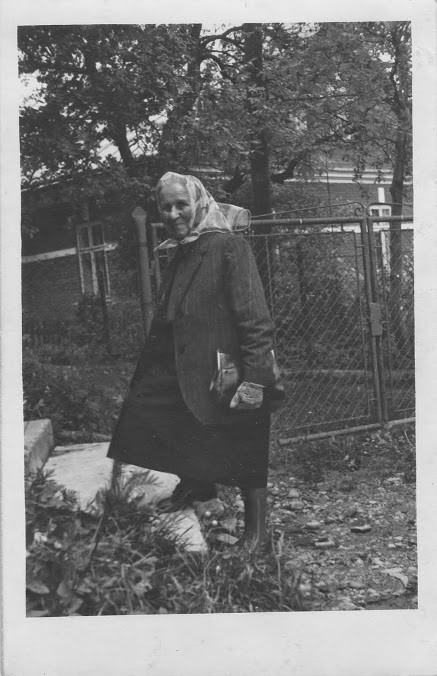 Ludwika Chomentowska from Łęki Dukielskie was awarded the honorary title Righteous Among the Nations but never got to receive her medal. The picture comes from the family archives of Halina Blicharczyk née Chomentowska, granddaughter of Ludwika Chomentowska.
Ludwika Chomentowska from Łęki Dukielskie was awarded the honorary title Righteous Among the Nations but never got to receive her medal. The picture comes from the family archives of Halina Blicharczyk née Chomentowska, granddaughter of Ludwika Chomentowska.
Also my late father used to talk about how Ludwika Chomentowska saved Mr. Srul’s life by hiding him in her basement. My farther knew the Chomentowski family very well since Ludwika Chomentowska was his father’s cousin, which in turn made her my father’s aunt. Additionally, her son, Antoni Chomentowski was my father’s peer, they were both born in 1916. I mention this because I’m sure that my father’s source of information was reliable. Ha also had a very good memory for names, dates and facts and he would tell about these events in great detail, which, unfortunately, I can’t recall today.
Ludwika’s son and daughter-in-law, Antoni and Władysława Chomentowski, also deserved the honorary title.The picture comes from the family archives of Halina Blicharczyk née Chomentowska, granddaughter of Ludwika Chomentowska.
According to my father, back in the day nobody in the village knew about “hiding the Jew” as he called it, not even Mrs. Chomentowska’s son. This piece of information really fired my imagination and allowed me to feel the terror of those times. My father considered Ludwika Chomentowska to be extremely brave and her deed – heroic. I share his conviction to this day and believe that she was the righteous among the inhabitants of my home village.
And who was Mr. Srul a.k.a. Israel? Unfortunately, nobody that I asked could remember his real name. In a 1913 directory I’ve found names of four men who traded cattle for a living: Althold Kelman, Fischbein Izaak, Majerowicz Izrael, Meisner Barl, Rosenthal Józef.
Based on the conversations I had with the inhabitants of Łęki Dukielskie, I’ve established that he couldn’t be any of the above mentioned men. A photograph sent to Mrs. Chomentowska in 1946 would also seem to confirm my theory, as the man on the photo looked like he was in his forties. It would then mean, that in 1913 he was too young to appear in any official directory.
One of the inhabitants of the Dukla area that I interviewed recalled that Mr. Srul’s real name might be Meisner. So – I’ve thought – he might be a son of Berl (Dow) [Berl (Ger.), Dow (Hebr.] Meisner, one of the four cattle traders from 1913. After all, Jews often ran family businesses. But did Berl (Dow) Meisner have a son named Israel?
I asked many institutions, home and abroad, for help finding any documentation regarding Israel (Srul) Meisner from Dukla. I published the photo Ms. Chomentowska was sent after the war. After several years of searching I was directed to Maria Seheń from the Yad Vashem Institute. It was thanks to her that I was able to establish that Dow Meisner had several children, including a son whose name was Israel, born in Dukla on 05.21.1902. His mother’s name was Rela.
Israel Meisner (registered in Israel as Meizner) used to live in Tel Aviv in Chaschmonaim 71 in 1959. He died in Donolo, Israel, in 1972. He was buried in the Holon Cemetery.
He was the person who submitted Pages of Testimony to the Yad Vashem Institute (https://yvng.yadvashem.org/) for his siblings, sister Bluma (born 1898) and two brothers, Zeev (born 1899) and Moshe (born 1896) as well as their families. These are the copies of the forms in which Izrael Meizner confirms the murder of his sibling.
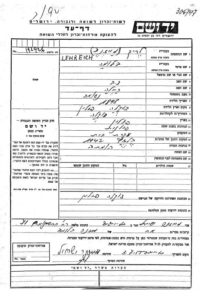 Bluma Lehreich nee Meizner was born in Dukla, Poland in 1898 to Dov and Reila. She was a housewife. During the war she was in Dukla, Poland. Bluma was murdered in the Shoah. This information is based on a Page of Testimony (displayed here) submitted by her brother, Yisrael Meizner
Bluma Lehreich nee Meizner was born in Dukla, Poland in 1898 to Dov and Reila. She was a housewife. During the war she was in Dukla, Poland. Bluma was murdered in the Shoah. This information is based on a Page of Testimony (displayed here) submitted by her brother, Yisrael Meizner
Zeev Meisner was born in Dukla, Poland in 1899 to Dov and Reila. He was a tailor and married to Feiga nee Finfer. Zeev was murdered in the Shoah. This information is based on a Page of Testimony (displayed here) submitted by his brother, Yisrael Meizner
Moshe Meisner was born in Dukla, Poland in 1896 to Dov and Reila. He was a merchant and married to Feiga. Prior to WWII he lived in Zmigrod, Poland. During the war he was in Zmigrod, Poland. Moshe was murdered in the Shoah. This information is based on a Page of Testimony (displayed here) submitted by his brother, Yisrael Meizner
Unfortunately, they don’t shed any light on Izrael Meisner a.k.a. Meizner himself. It’s also uncertain whether this is the Israel I’m looking for.
I found some hope in the information emailed to me by Debbie Raff from California, whose grandfather, as it turned out, also named Israel Meisner, came from Nowy Żmigród. She also knew people from Dukla related to the Israel Meisner I was searching for. Unfortunately, in her next email she stated that those who she received replies from had never heard of this particular relative, others still didn’t reply to the question she had sent on my behalf.
It was Debbie though who drew my attention to Pages of Testimony submitted in 1955 by Tzipora Meizner who at the time lived at the same address as Israel Meizner. This could mean that she was his second wife. After all, he did write in a letter to Ludwika Chomentowska that he had started a new family in Israel.
Tzipora submitted Pages of Testimony for many people, including Etel Meisner from Dukla and her daughter, Reila Malka. Unfortunately, there’s no information regarding either Etel’s (and later Tzipora’s) husband, or Reila Malka’s father. Only that Reila Malka was 8 years old when she was murdered. I can only assume that Etel was Mr. Srul’s first wife and Reila Malka was his daughter.
If that was the case, why didn’t Israel Meizner submit Pages of Testimony for his wife and daughter? Maria Seheń explained to me, that Holocaust survivors often wouldn’t submit forms for their loved ones who were murdered in the Shoah because it was too painful.
In the Yad Vashem’s Central Database of Shoah Victims’ Names I found many Pages of Testimony that Israel Meizner submitted for the members of his extended family. There is also one form from 1956 that was most likely submitted by him [This particular form was signed with the last name Meizler, not Meizner, though most likely it’s just a typo.] for Israel Majerowicz. That was also one of the four men form the 1913 directory. According to the information included in the form, he was born in Żmigród in 1880 to Dawid and Chana. He was married to Mindl née Israel. He lived in Dukla before and during the war. There is no information about children whatsoever. Taking all that into consideration, I can say for sure that Mr. Srul that I’m searching for couldn’t have been the man from the 1913 directory, since the latter was murdered in the Holocaust.
So who was Mr. Srul? This question still remains open. Will I ever be able to confirm that he was in fact Israel Meizner that I mention in this text? Or will I be forced to start over my entire research because someone from the Dukla area who knew the real name of the cattle trader turns up? I’m sure Łęki wasn’t the only village he used to visit on a weekly basis. Did he have any children and grandchildren from his second marriage who could confirm that it was their father or grandfather that was saved by one Righteous Among the Nations woman from Łęki, Ludwika Chomentowska?
***
And who were the remaining Jews that lived before the war in Dukla, murdered during the Holocaust, for whom Israel Meizner submitted Pages of Memory? Maybe some of the inhabitants of Dukla could tell their story?
Judka
Before the war there was another Jewish merchant who was known to people in Łęki by the name of Judka. He used to buy eggs and sell soap and matches in the village. Just like Mr. Srul, he used to come to Łęki on foot through the forest. Judka had a beard and was quite tall. He used to wear a hat.
„Judka was a philosopher. I can’t really remember her anymore, but there was this girl in the village that used to tease him, she pulled his beard but he never got angry about it, he just laughed. He was just really friendly” – recalls Stefania Baryłowa and adds that both Srul and Judka lived by the market in Dukla. “They were always in a hurry. They always came with a business to settle: quickly sell whatever they had to sell, quickly buy something and go back home.” Was Judka really Juda Józef Landau from the 1913 directory? Unfortunately, that’s another thing I don’t know.
![]()
Lejba
There’s another mysterious person, a Jew named Lejba who lived in Dukla that would often visit Łęki. According to the information I gathered from the oldest inhabitants of Łęki, he was a glazier. His workshop was located in the back of the Nawrocki family’s house. When he had more work to do, he would stay in Łęki overnight. Unfortunately this is all that I know of him.
Jolanta van Grieken-Barylanka
Dziękuję Ewelinie Borcz-Sprusińskiej za przetłumaczenie tekstu i Wojtkowi Sprusińskiemu za konsultacje językowe.

